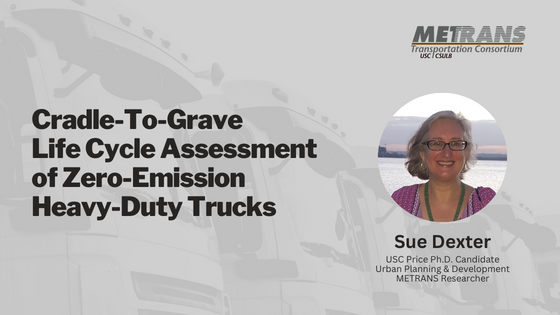News | Cradle-To-Grave Life Cycle Assessment of Zero-Emission Heavy-Duty Trucks
Stop the VideoNews

Cradle-To-Grave Life Cycle Assessment of Zero-Emission Heavy-Duty Trucks
Friday, November 18, 2022

Heavy duty trucks are a leading contributor to global climate change. California has enacted technology forcing legislation to replace fossil fuel trucks with zero emission vehicles to address freight transportation emissions. These vehicles include both battery electric and hydrogen fuel cell class 8 trucks. To determine which type of vehicle provides the most significant savings in energy consumption and emissions over diesel, a cradle to grave life cycle assessment (LCA) using Argonne National Laboratory’s AFLEET and GREET tools explores energy and emissions of different truck powertrains.
The analysis includes upstream raw material and mineral extraction, manufacturing, distribution, operation, end of life recycling/disposal, and the fuel production phase of electric, hydrogen fuel cell, and diesel models. From this method, stage, place, or materials assessment can reduce energy consumption and GHGs. Results from the LCA modeling suggest that battery electric powertrains are superior at reducing the lifecycle carbon footprint more than a comparable hydrogen fuel cell model using standard hydrogen producing methods. Significant investments in renewable green hydrogen production are needed to make fuel cell technology a viable option.
Sue Dexter is an Urban Planning and Development Ph.D. candidate at the University of Southern California studying sustainable goods movement, urban spatial structure, and transportation technologies to reduce carbon emissions. Her dissertation investigates life cycle impacts of alternative fuel heavy-duty cargo vehicles on greenhouse gas emissions and fleet operational impacts arising from their implementation. Formerly she was a Program/Project Manager at Toyota Motor North America, specializing in large-scale distribution and system development projects. Sue has a master’s degree from the London School of Economics in Operational Research with an emphasis on network optimization.
News Archive
- December (1)
- November (6)
- October (4)
- September (1)
- August (3)
- July (4)
- June (3)
- May (7)
- April (8)
- March (10)
- February (8)
- January (7)
- December (7)
- November (8)
- October (11)
- September (11)
- August (4)
- July (10)
- June (9)
- May (2)
- April (12)
- March (8)
- February (7)
- January (11)
- December (11)
- November (5)
- October (16)
- September (7)
- August (5)
- July (13)
- June (5)
- May (5)
- April (7)
- March (5)
- February (3)
- January (4)
- December (4)
- November (5)
- October (5)
- September (4)
- August (4)
- July (6)
- June (8)
- May (4)
- April (6)
- March (6)
- February (7)
- January (7)
- December (8)
- November (8)
- October (8)
- September (15)
- August (5)
- July (6)
- June (7)
- May (5)
- April (8)
- March (7)
- February (10)
- January (12)















